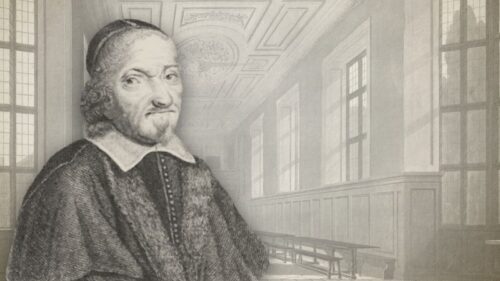-
37 An Examination Of Gill’s Goat Yard Declaration Of Faith (1729)
I would like to welcome you back to another study in Bible Doctrine. In our previous study, I laid out for you a historic backdrop to Gill’s Goat Yard Declaration. For this study, I would like to look at the document itself. However, it seems appropriate, given the fact that the Declaration was designed for a single congregation, that we first take a look at that congregation, to gain a bird’s eye view of its history and doctrinal positions. The Goat Yard Declaration was named after the church for which it was drawn up. It was known as the church meeting at Goat’s Yard Passage, on Fair Street, in Horsley-Down, Southwark, and they met in the Goat’s Yard Chapel. The origin of the church may…
-
36 A Historical Backdrop To Gill’s Goat Yard Declaration Of Faith (1729)
I would like to welcome you back to another study in Bible Doctrine. In our previous study, I introduced you to the ministry and writings of an 18th century Baptist theologian named John Gill. Aside from his pastoral duties in London, he was a prolific writer, the author of more than twenty-five works, many of which were large and exhaustive volumes. Of these works, there are four which I recommended you should have and of which you should make frequent use: 1. “The Cause of God and Truth” (1735-38) 2. “An Exposition of the Old and New Testaments” (1746-48; 1763-66) 3. “Goat Yard Declaration of Faith” (1729) 4. “A Body of Doctrinal and Practical Divinity” (1769-70) Having already given an overview and samples of the…
-
The Great Ejection (1643-1660)
Having spent most of my life in Free church circles, I learnt very early of the severe persecutions meted out in England during the 17th century to Dissenters, Non-Conformists and Non-Jurors who wished to preach, teach and witness in Anglican parishes. Two books which became of special influence in forming my judgement, the first many years ago and the second in more recent years, were Thomas Coleman’s The Two Thousand Confessors of Sixteen Hundred and Sixty-Two and Edmund Calamy’s The Nonconformist’s Memorial, a three-volumed work on the same period. I still treasure these works which served under God to cause me to abhor any form of religious, political and social persecution. As a result of reading such books as the above, however, I came to…
-
Affirmation 2010: An Attempt To Downgrade Orthodoxy
The Bible League informs us in their ‘www.Affirmation-2010.org’ website of Malcolm Watts’ initiative in drawing up a new para-church creed of that name to win ‘the widest possible agreement’ in ‘various church bodies and constituencies’. A copy of the statement is provided under a separate menu and a form is attached soliciting readers to sign this rather complicated and drawn out Statement of Faith. The names of two dozen subscribers are added which represent a wide area of evangelical witness. We are told that these men ‘are able unitedly to subscribe to the truths of the Word of God as set forth in the Affirmation.’ In a two columned article published in the English Churchman, Issue 7787, 2010, Affirmation 2010 is presented by its sponsors…
-
Affirmation 2010 Deals With Critics
The adverse criticism levelled at Affirmation 2010 in a good number of Christian magazines and digital publications has moved The Bible League Trust (BLT) to over-react with an eight point, five-paged rebuttal claiming that all such criticisms are unfounded, ill-conceived, fallacious, confused and indicate a departure from sound teaching. In their condemnation of honest criticism, they sarcastically denigrate the intelligence, integrity and orthodoxy of their critics. Besides choosing to exonerate themselves by ridiculing those who question their policies, they play down this opposition, claiming that they have only found ‘one or two critiques’. This must be the understatement of the year as their ‘critical responses’ themselves refer to a much larger number of concerned people.
-
The Old Paths versus New Divinity: Exemplified by William Huntington and Andrew Fuller
The work of the Banner of Truth Trust proved a great encouragement in my spiritual development and I became an enthusiastic reader of their magazine from its start. Throughout the following years, especially during the seventies and eighties, I was able to break away from my work in Sweden and Germany to attend those inspiring Leicester Conferences which blessed the soul of so many pastors and teachers and gave them a love for Reformed doctrines and personal holiness. In those early halcyon days of theological unity and brotherly love, we young men believed that we were on the verge of a great revival and a return to the Old Paths of evangelism and soul-care which had become overgrown with the weeds of Liberal theology. We…




